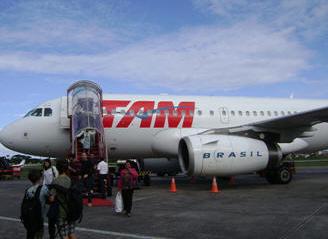|
|||||||||||||||||
|
|
|
|||
|
LAN Airlines And TAM
Agree To Continue With Merger By Bill Goldston |
||||
 |
October 5, 2011 - After thorough analysis of the content
and implications of the resolution of the Tribunal de
Defensa de la Libre Competencia de Chile (TDLC), Chile’s
antitrust court, regarding the merger process between
LAN Airlines and TAM, the Boards of Directors of both
companies have confirmed their decision to move forward
with the transaction.
LAN and TAM believe the mitigation measures imposed by the TDLC do not significantly impact the synergies generated by the transaction and do not modify in any material respect the companies’ joint strategic development plans. From the analysis, the estimated impact on the expected synergies would not exceed US$10 million per year, reducing by such amount the total previously announced synergies of US$400 million. |
|||
|
The mitigation measures considered in the judgment by the TDLC are broadly in line with the measures that LAN and TAM were prepared to accept in January 2011 in the out-of-court settlement negotiated with the Fiscalía Nacional Económica (FNE), Chile’s antitrust authority.
Nevertheless, on October 3, LAN and TAM presented an appeal
before the Supreme Court objecting three of the mitigation
measures which the companies deem to be unconstitutional and
disproportionately severe. The three measures being appealed
are:
1. The
seventh condition, which establishes the obligation to submit
for approval ex – ante certain code share agreements that LATAM
Group may have reached with airlines outside of its chosen
alliance. This is unnecessary considering the existence of an
alternative measure, which requires the company to inform the
FNE of all such agreements so that it may analyze and determine
if they are detrimental to the competitive environment;
2. The eight condition, which establishes the obligation to give up four fifth freedom rights to Lima, Peru. This condition goes against a 2009 ruling of the Supreme Court, which overturned a previous ruling of the TDLC which attempted to impose measures that would have had the same impact; and 3. The fourteenth condition, which provides excessive intrusive powers to the FNE and to the consultant that the TDLC requires the company to hire to collaborate in the surveillance process. The company considers that the proposed “unrestricted, total, permanent and continuous” access that this consultant would have, both in and outside of Chile, to LATAM Group’s data bases, systems, accounting, installations, offices, call centers and others, is unlimited and differs from what is provided for by law since it lacks previous judicial controls and is therefore illegal in that it affects constitutional rights. |
||||


